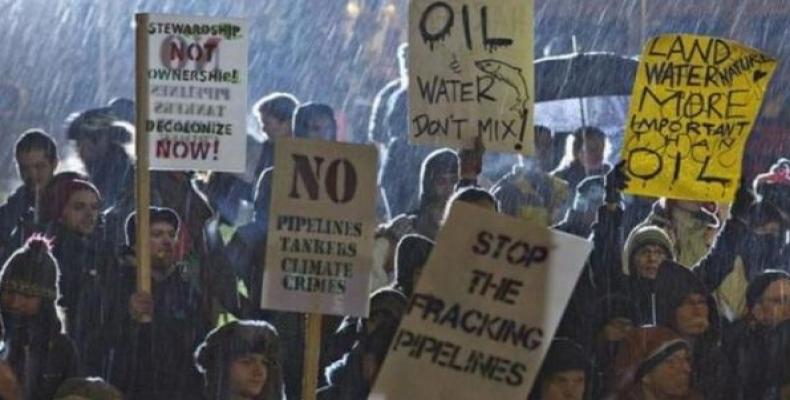Montreal, October 9 (RHC)-- In a major win for Indigenous communities and environmental activists across Canada, TransCanada — the oil company behind the controversial Keystone XL pipeline — canceled two of its projects. Its Energy East and Eastern Mainline pipelines would have snaked more than one million barrels of crude oil across the country, the first running from the province of New Brunswick to the city of Montreal, the latter across central parts of the province of Alberta, expanding an existing oil pipeline.
“It’s really exciting because this is the first time a fossil fuel project has been stopped because a company has been held accountable,” Atiya Jaffar, a campaigner at 350.org, a global climate justice organization, told teleSUR. “(This shows) that people-powered organizing and resistance works," she added.
While TransCanada cited “changed circumstances” for its cancellations, the announcement occurred in the wake of one made by the administration of Canadian Prime Minister Justin Trudeau, which declared that the Energy East pipeline would have to pass a new climate test. Jaffar explained that Indigenous activists and their allies had long mobilized for such a move, when the Energy East pipeline was first announced four years ago.
While she said that Trudeau’s predecessor, Stephen Harper and his Conservative government, had been on “the border of climate change denial”, Liberals have at least expressed interest in being “leaders against climate change.” Thousands of people, she explained, have kept the Liberals accountable since their election in 2015 on their campaign promise to reinstate a new climate review process for pipelines.
Indigenous communities in particular have been on the frontlines of organizing against TransCanada’s projects. Following the announcement, Grand Chief Serge Simon of the Mohawk Council of Kanesatake told CBC that this “shows that when First Nations stand together, supported by non-Indigenous allies, we win."
For Kirsten Perry, a climate justice organizer based in Montreal — where a bulk of campaigning has occurred against Energy East as it would have run through the city — a major factor in the pipeline’s demise were the disruptions made by activists at hearings on the project by Canada’s National Energy Board, NEB. There, organizers made clear that the project didn’t include “important things such as Indigenous rights”, she told teleSUR.
A number of politicians from several municipalities also opposed TransCanada’s projects, representatives from over 80 cities and towns along the proposed pipeline’s path banded together to declare opposition “on the ground its risks far outweighed its benefits.”
“I’ve been saying since Day 1 that (TransCanada was) arrogant and condescending,” Montreal Mayor Denis Coderre told reporters on Thursday. “It’s an enormous victory.” While environmental groups and Indigenous communities are celebrating what they describe as a considerable victory, many are now focusing their energies on the Kinder Morgan Trans Mountain pipeline, which Trudeau approved last November.
“There’s always a double standard with Liberals,” Jaffar said, saying that while they kept their promise on instating the climate test for Energy East, they have not for Kinder Morgan. Indigenous groups are continuing to challenge the pipeline that is set to carry highly toxic tar-sands oil almost 1 thousand miles to the west coast of the country in court, which will begin construction later this month.
“Expect people to rise up as construction starts soon,” pressed Jaffar. “People power made it so that pipelines were not good business,” added Perry. “We will use similar strategies and tactics on other projects.”
Activists Celebrate ‘First Time Fossil Fuel Projects Held Accountable’ as Two Major Canadian Pipelines Canceled

Articles en relation
Commentaires
Laissez un commentaire
Tous les champs sont requisPlus de visites
- Les États-Unis annoncent des restrictions en matière de visas liées à la coopération médicale internationale de Cuba
- Cuba : les migrants à Guantanamo sont une provocation et un affront à la souveraineté (+Photos)
- Le gouvernement cubain condamne les intentions des États-Unis concernant la base navale de Guantanamo
- Le chanteur populaire Paulo F.G. meurt dans un accident de voiture à La Havane
- Washington révoque la licence accordée à Chevron, "une décision nuisible et d'inexplicable"

